Compassion ~ Commitment Reverence ~ Reconciliation
CURRENT SERMON
The messages delivered each Sunday by our clergy at St. Augustine’s in-the-Woods are powerful expressions of our values and theology. Below is the most recent, but you can also view the Sermon and Video Archives below.
The 5th Sunday of Lent – Year C – The Rev. Canon Joan Anthony 4.6.25
The story of Israel and God has many twists and turns. It begins with the promise to Abraham and Sarah that they would be the parents of a great nation and that God would be the God of this nation and they would be God’s special, chosen people. They were largely a nomadic people living in tents, tending their sheep and searching for water in the dry desert and being guided by God. It was not an easy life, but they were free and they prospered. In time this nomadic people found themselves in Egypt where they were no longer free. They could no longer worship God or keep the commandments given them. They were powerless and it seemed hopeless. After many years God spoke to Moses out of a burning bush sending him to the elders of Israel. This is the long awaited fulfillment of God’s promise to rescue Israel from their slavery and give them their land. Through a series of negotiations, and some rather horific plagues Pharoah was convinced to let the people of Israel go. So began the time of wandering in the desert, forty long years to reach the land promised by God to them. Each year they took the time to remember what God had done for them and to give thanks. This annual event was known as Passover. Eventually the people ended their wandering and settled in the land. They prospered and they became the envy of others surrounding them. In their fear of their enemies they forgot to trust God.
The Israelites living in the southern kingdom of Judah were defeated by the army of King Nebuchadnezzar of Babylon. The city of Jerusalem and the Temple were destroyed and most of the people led away into exile where they remained for some 200 years. They had lost everything: their land, their homes, their way of life and their God. The burning questions as they were led away were these: Where is God? Why has God forsaken us? How did God let this happen?
Aren’t these still the central questions we ask in times of crisis? Where is God? How did God let this happen? The prophet’s tell us that the people had been disobedient, had failed to continue to trust God and live in the ways of the Commandments. It seemed as if God had turned God’s face away as if God were punishing them. After a time the word of God came to Isaiah, words of hope and comfort, words familiar to us as well. “Comfort, O comfort my people says your God. Speak tenderly to Jerusalem, and cry to her that she has served her term, her penalty is paid…”. God had not forgotten them.
In the course of time, a new strong nation and ruler, Cyrus of Persia came to power and defeated the Babylonians. In this the prophets and the people of Israel, still in captivity, saw the hand of God. Their God was about to save them once again. And so it was. Cyrus issued a decree allowing the exiled Judean’s to return to their homeland and rebuild the Temple in Jerusalem. This was a new “exodus” from captivity to freedom. In the words of Isaiah, Israel had “served her term”, “her penalty had been paid”. God had redeemed his people and now was blessing them once again. God spoke again through the prophet Isaiah. “Thus says the Lord,…I am about to do a new thing, now it springs forth, do you not perceive it?” The “new thing” was the renewed covenant with the people of Israel. This was the answer to their question: Where is God? God was with them in the midst of the exile. God is with us in the midst of our own exiles, our own crisis, personal, national or world wide. God is a God with us, beside us, and in our history. God is not “out there” but right here, in the nitty gritty of life. God who is always with us has done many “new things” in the world and in our individual lives and continues to do them.
Centuries later, in the town of Bethany, 2 or so miles from Jerusalem, lived Mary, Martha and Lazarus, friends of Jesus. It is six days before the Passover, that celebration that commemorates the liberation of the Jews from slavery in Egypt. And yet, though they live in Jerusalem and Judah, the people are enslaved once again, this time to the power of Rome. Six days before the Passover is a dangerous time. People from all over Judea have crowded into the city of Jerusalem. It is a time ripe for discontent, and rebellion, what the Romans fear most. Roman soldiers from Caesarea have come to camp just outside the city, in case of trouble. Their presence reminds the people of the power of Rome and their own weakness. A dangerous time, in years past trouble had broken out. Now there is this new teacher, this new rabbi who is said to have the power to heal, who is said to have raised Lazarus from the dead. This new rabbi whom the people want to make their King. A dangerous time.
Six days before the Passover, Martha, Mary and Lazarus give a dinner for Jesus. Judas is there as well and so are the rest of the twelve. This is not just any dinner. This is the Sabbath, and a most important part of the Sabbath celebration is the meal. It is a time of family, of rest, of special food and conversation. It is a time of songs, prayers and remembering. With Passover so close, some of the conversation might have been about other times when the Jews had been under a foreign power: Egypt, Babylon, Persia and now Rome. The Jews long for a “new exodus”. Perhaps Jesus the rabbi had reminded them of the words of God to the prophet Isaiah. Words of comfort and encouragement, and words that promised that God would do “a new thing” in their midst.
Two characters are central to this story. The rest, Lazarus, Martha and the disciples fade into the background. Mary and Judas take center stage. Their words or lack of words and their actions are a stark contrast. Both are disciples, both have been with Jesus for the years of his ministry, and both are witnesses to this “new thing” that God is doing. But they act very differently. Mary is faithful to the end and Judas gives way to temptation and ultimately betrays Jesus to the Roman authorities. Mary is able to see the “new thing, as it is beginning to spring forth. Judas is stuck in remembering “former things”, trapped in the things of old, of the way “things used to be.” Judas can not see what is possible and what God in Jesus is doing.
The meal is ended but all are still at the table. Mary comes with a container of nard. This costly ointment, perhaps 3/4 of a pound was worth a years’ wages for the average person in Jerusalem. What happens next is shocking, more shocking than we can imagine. Mary kneels down and anoints Jesus’ feet with the nard then she wipes them with her hair. It is unheard of for a woman to touch a man who is not a member of her immediate family. Washing Jesus feet, anointing them with ointment and wiping them with her hair is an especially intimate action. But Mary does this as a witness, a silent witness to the new thing of God about to come into being. Mary does not speak, the time for words is fading. Mary acts. She accepts her role now and into the future the role of a servant, a disciple and a witness to Jesus the Messiah. God is once again engaged in doing a new thing. We will discover more about this new thing as we walk the journey of Holy Week in the days to come.
Judas immediately voices and objection to what has happened. He is the only one other than Jesus who speaks. The ointment could be sold and the money given to the poor. It was a lot of money and a lot of good could be done with it. True but not the point. Jesus intervenes in a way that must have again shocked those around the table. He not only permits Mary to anoint his feet but he indicates that this anointing is in preparation for his burial. Death and burial has intruded into what had been a happy Sabbath celebration.
It would be a mistake to attribute Judas’s complaint to a serious moral failings, to the criminal desire to steal. He may have only been voicing what others were thinking. We really don’t know the motive of Judas, only later do we discover he has betrayed Jesus. For now, it is easy to make Judas the scapegoat, to see him as the bearer of human sins. People have been doing this for centuries. But Judas is just a human being, like everyone gathered around the table in Bethany. A human being tempted just as we are often tempted.
What was Judas’s motive? Was the objection he made real and valid? Could Judas not see the new thing God was about to do in Jesus? Was he trapped in the old ways? It is not for us to know. It is for us, however, to guard against the easy assumption that we can know what is in another human beings heart.
It is a time honored practice for readers of scripture to imagine themselves as one or more of the characters a story. It is in doing this that we can learn about ourselves and about our relationship with God. A respected professor of theology has this to say about what we can learn from the witness of both Mary and Judas. “Judas plays just as important a role in John’s story of Jesus’ death as does Mary. The choice for…{us} is not whether to identify with one or the other. The Christian disciple is neither Mary nor Judas but a paradoxical combination of both. The grace of Jesus Christ includes them both, both the faithful and the unfaithful. Both are included with the bright, transforming light that the cross casts in a dark world.”
It is all connected: Egypt, Babylon, Bethany, Jerusalem. These are the places where God has done a new thing. Washington D.C., Seattle, Freeland, your street and mine. All connected. These are the places where God is even now doing a new thing. Do you see?
Sermon Archive
To read a particular favorite, read one you may have missed or get acquainted with our clergy, please visit the sermon archive.


